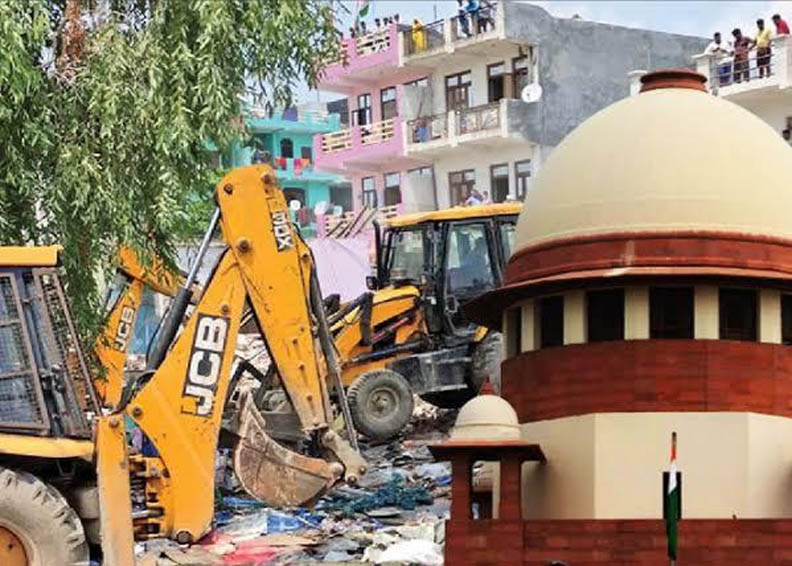New Delhi, September 2, 2024 – In a landmark hearing, the Supreme Court of India has raised serious questions about the legality and ethics of demolishing houses solely because the owners are accused of crimes. The court’s remarks came during a session addressing multiple petitions challenging the use of bulldozers to raze properties linked to individuals accused of criminal activities.
The Context of the Controversy
The practice of demolishing properties, often referred to as “bulldozer justice,” has been a contentious issue in India. This method involves the destruction of homes, shops, and other premises belonging to individuals accused of crimes, often without a court order or due process. The practice has been criticized for being a form of instant justice that bypasses legal protocols and violates the rights of the accused.
The Supreme Court’s intervention was prompted by petitions from aggrieved homeowners in Rajasthan and Madhya Pradesh. In Rajasthan, a house was demolished due to an alleged offense committed by the tenant’s son, while in Madhya Pradesh, a joint family’s ancestral home was razed.
Supreme Court’s Observations
During the hearing, a bench comprising Justices B.R. Gavai and K.V. Viswanathan expressed strong disapproval of the practice. Justice Gavai questioned, “How can a house be demolished just because the owner is accused? It can’t be demolished even if he’s convicted. Demolitions must follow legal protocols”.
The bench emphasized that while they do not support illegal constructions, any demolition must be carried out in accordance with the law. “We are not for illegal constructions on roads or other public spaces, but the demolition of properties has to be in accordance with the law,” the court stated.
Government’s Position
Solicitor General Tushar Mehta, representing the central government, affirmed that properties cannot be bulldozed merely because the owner is involved in a criminal case or even convicted. “It can only be done strictly following the rules and procedures prescribed under municipal laws,” Mehta said.
Mehta’s statement underscores the need for adherence to legal protocols and the importance of due process. The Solicitor General’s remarks were in response to the court’s concerns about the arbitrary use of bulldozers to demolish properties without following proper legal procedures.
Petitioners’ Arguments
Senior Advocate Dushyant Dave, representing the petitioners, urged the court to issue directives preventing such practices nationwide. Dave argued that the demolitions were not only illegal but also a violation of the fundamental rights of the accused. “The practice of bulldozing homes of accused individuals is a blatant disregard for the rule of law and due process. It is an act of retribution rather than justice,” Dave contended.
The petitioners highlighted instances where properties were demolished without any prior notice or opportunity for the owners to present their case. They argued that such actions were not only unjust but also set a dangerous precedent for the misuse of power by authorities.
Public and Media Reactions
The Supreme Court’s observations have sparked widespread debate and discussion. Legal experts and human rights activists have welcomed the court’s stance, emphasizing the importance of upholding the rule of law and protecting the rights of the accused. “The court’s intervention is a significant step towards ensuring that justice is served through legal means rather than arbitrary actions,” said human rights lawyer Vrinda Grover.
Media coverage of the hearing has been extensive, with news channels and publications providing in-depth analysis and updates. Political analysts have noted the potential implications of the court’s observations on the broader discourse around law enforcement and the rights of the accused.
Implications for Law Enforcement
The Supreme Court’s remarks are likely to have far-reaching implications for law enforcement practices in India. The court’s emphasis on following legal protocols and due process serves as a reminder to authorities about the importance of adhering to the rule of law. “The court’s observations highlight the need for a balanced approach to law enforcement that respects the rights of individuals while ensuring accountability for criminal activities,” said former Supreme Court judge Justice Madan Lokur.
The court’s intervention also underscores the need for clear guidelines and regulations governing the demolition of properties. Legal experts have called for the establishment of a standardized procedure that ensures transparency and accountability in such actions.
Future Legal Proceedings
The Supreme Court has scheduled further hearings on the matter for September 17, 2024. The court has indicated that it will consider issuing guidelines on the demolition of illegal buildings to be enforced across the country. “Let the suggestions come. We will issue guidelines on a pan-India basis,” Justice Gavai remarked.
The upcoming hearings are expected to provide further clarity on the legal framework governing demolitions and the rights of property owners. The court’s decision will likely set a precedent for future cases and shape the discourse around law enforcement practices in India.
Conclusion
The Supreme Court’s questioning of the legality of demolishing houses of accused individuals marks a significant moment in the ongoing debate around “bulldozer justice.” The court’s emphasis on following legal protocols and due process serves as a reminder of the importance of upholding the rule of law and protecting the rights of the accused.
As the legal proceedings continue, it will be crucial to monitor the court’s decisions and the broader implications for law enforcement practices in India. The outcome of this case will likely have far-reaching consequences for the future of justice and accountability in the country.
For now, the focus remains on the upcoming hearings and the potential guidelines that the Supreme Court may issue. The court’s intervention serves as a pivotal moment in the ongoing discourse around law enforcement, justice, and the rights of individuals in India.
For More News Update, Follow Read Now News
